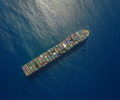

Danish container shipping giant A. P. Moller-Maersk will take delivery of eight large ocean-going vessels in 2024 that can run on renewable methanol, which should stimulate supply of environmentally friendly fuel, company management said Aug. 24.
The 16,000 twenty foot-equivalent vessels will be introduced in the first quarter of 2024 and will be built by Hyundai Heavy Industries. The agreement includes an option for four additional vessels in 2025, Maersk said in a statement.
The series will replace older vessels and save 1 million mt/year of CO2 emissions, the company said.
The announcement comes after Maersk previously said it secured 10,000 mt of renewably sourced methanol to fuel its first carbon-neutral methanol-powered feeder vessel. That vessel has a capacity of 2,100 TEU and is expected to enter service in 2023.
The volume may seem small but this project could be a potential blueprint for scaling up, while many observers talk about the chicken and egg problem surrounding renewable fuel supply and demand, Berit Hinnemann, Maersk’s head of decarbonization business development, said during a press conference accompanying the announcement.
The renewable methanol offtake supply deals that the new vessels imply will encourage projects to produce the fuel and get them off the drawing board, management said during the press conference.
As for price, these vessels will cost about 10%-15% more than conventionally-fueled ones would, the company’s statement said.
“We are quite sure that we will see lower costs going forward when we start scaling, when we start seeing more vessels being built and so on,” it said. “Then we will see a more dramatic scaling, as you see in all industries.”
In terms of conventionally produced fuel costs, S&P Global Platts assessed methanol T2 FOB at Rotterdam at $488.60/mt on Aug. 23, equivalent to $22.76/gigajoules. Platts assessed 0.5%S fuel oil, the currently prevalent bunker fuel and which has greater energy density, at $488/mt or $11.19/gj.
Maersk is pushing ahead with methanol as a future shipping fuel because the technology already exists and it will be one of the future marine solutions, along with ammonia, management said during the press conference.
Ammonia, which has issues of toxicity, may be difficult to reconcile with bunkering in cities, they said.
Source: Platts